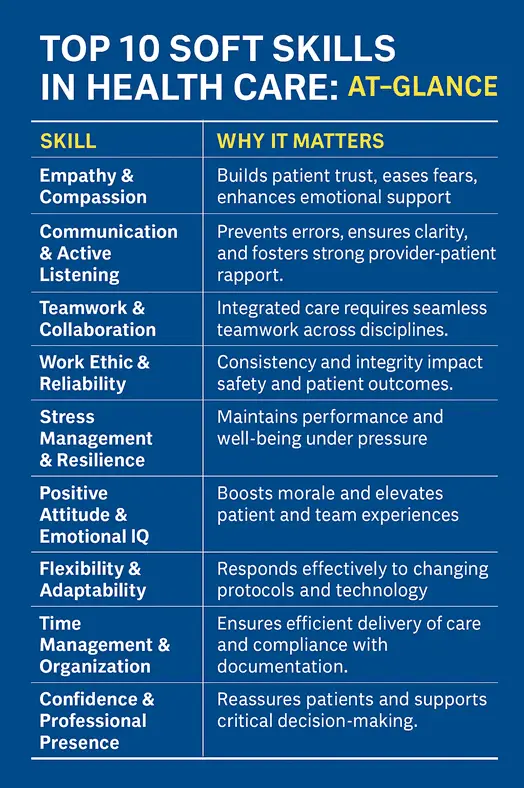
Updated: September 3, 2025
There’s more to healthcare than clinical tasks. Yes, they matter, but they represent only a small part of the big picture of patient care. Just as essential are the many soft skills that determine the quality of the patient’s experience.
Ranging from empathy to communication, collaboration, and even adaptability, these qualities can have a huge impact. They promote greater patient engagement and satisfaction, which makes patients more likely to disclose important information, adhere to treatment plans, and continue committing to preventative care.
Why Soft Skills Matter in Healthcare
Sometimes referred to as “personality skills,” soft skills involve the many non-technical abilities that help healthcare professionals (and their patients) thrive. They are crucial because they foster a profound sense of trust, enabling open communication and full patient investment in their care. This ensures patients feel valued and respected.
Soft skills are also important because they amplify technical and clinical skills. For instance, without effective time management, healthcare professionals may struggle to keep up with their rotations. This can lead to inadequate patient care and an increased likelihood of medical errors, ultimately jeopardizing patient safety.

Interpersonal Skills for Healthcare
Interpersonal skills involve the many abilities that allow us to interact effectively with one another. In the context of healthcare, these skills determine how professionals connect with patients, leading to initial rapport and a powerful sense of trust.
So, what are soft skills in healthcare?[1] We’ve highlighted a few of the most important below:
#1. Empathy and Compassion
Empathy grants healthcare professionals a deep understanding of how their patients feel — and why. Essentially, this involves stepping into the patient’s shoes to fully appreciate their unique perspectives.[2]
This should not be confused with compassion, which moves beyond empathy to inspire action. An empathetic healthcare professional understands why their patients feel nervous, but compassion compels them to take specific steps to ease anxiety. For example, this may mean speaking calmly and walking patients through every step of anticipated procedures.
#2. Communication and Active Listening
Communication determines how we exchange information and ideas. In healthcare, this takes many forms, including verbally conveying information about diagnoses to patients or explaining treatment options.
This is a two-way street, however, and listening is just as important as articulating information. Through active listening, healthcare professionals can fully understand patients’ thoughts and feelings, encompassing not only what patients say, but also drawing cues from their body language or tone of voice.
#3. Teamwork and Collaboration
Today’s team-based models of care reveal how complementary skill sets can help a variety of healthcare professionals contribute to the big picture of patient health and well-being.[3]
Teamwork in healthcare begins with effective delegation but may also involve interdisciplinary rounds and patient-centered collaboration. Individuals can contribute by actively listening to fellow healthcare professionals and showing respect for others’ expertise or perspectives.
The American Association of Critical-Care Nurses (AACN) adds that true collaboration involves a shared pursuit of common goals, facilitated by “giving power and respect to each person’s voice, integrating individual differences, resolving competing interests, and safeguarding the essential contribution each makes.”[4]
Personal Skills for Healthcare Workers
Although today’s discussions of soft skills tend to focus on interpersonal qualities and emotional intelligence, many other attributes influence job performance in the healthcare sector.
Sometimes referred to as personal skills, these form the basis of a concept known as grit, which is the ability to work through challenges while remaining diligent under pressure. Factors that contribute to professional grit include:
#4. Work Ethic and Reliability
The concept of work ethic surrounds the intrinsic value of hard work, which is widely regarded as virtuous in its own right. In healthcare, this involves corresponding qualities such as determination and diligence. Essentially, someone with a strong work ethic believes that it is important to work hard and follow through on that belief.
#5. Stress Management and Resilience
A solid work ethic is important, but this should not be taken to an extreme. Otherwise, healthcare professionals can be highly susceptible to burnout.
Resilience reveals whether healthcare professionals can withstand workplace pressure or bounce back from failures. This should be supported by an overall emphasis on stress management, which helps healthcare professionals advocate for themselves and find balance in their day-to-day lives.
#6. Positive Attitude
A positive attitude can contribute to all other qualities listed in this guide. This does not necessarily have to involve a sunny outlook in all situations. However, it does suggest that, on the whole, the most effective healthcare professionals will approach challenges with some element of optimism.
This means focusing on potential solutions, even when setbacks emerge, while prioritizing growth and framing obstacles as learning opportunities. A positive attitude can have a profound impact on various other soft skills, enhancing confidence while also facilitating effective collaboration by fostering welcoming and supportive work environments.
#7. Flexibility and Adaptability
Change is constant in today’s dynamic healthcare environments, where new patients, equipment, techniques, or even research may alter the techniques, workflows, or priorities we currently take for granted. Flexibility makes it easier to adjust to these new realities while maintaining core values, enabling healthcare professionals to “meet others halfway.”
Adaptability is similar, but goes to the next level, allowing healthcare professionals to actively embrace change while challenging their own deeply-held beliefs. This means reframing change as an opportunity for growth and then proactively seeking the knowledge and skills needed to make the most of these opportunities.
#8. Time Management and Organization
Today’s healthcare professionals juggle sizable caseloads accompanied by significant administrative requirements. Time management makes it easier to tackle a continuously expanding to-do list without feeling overwhelmed. This rests on the principle of prioritization: always tackling the tasks deemed most urgent and important before moving on to other priorities.[5]
The American Nurses Association highlights how important it is to avoid multitasking, which, although often tempting, may drain precious cognitive resources. Instead, designated time should be carved out for prioritized tasks, with lower-priority efforts intentionally tackled whenever quieter periods arrive.
#9. Confidence and Professional Presence
Through extensive training and mentorship, healthcare professionals can gain confidence in their abilities. This is characterized by a positive self-concept and the belief that these professionals are capable of handling difficult situations or addressing complex patient needs.[6]
Confidence inspires a strong professional presence, which shapes everything from communication to decision-making and can even set professionals on the path to greater influence through leadership.
#10. Receptive Attitude and Continuous Learning
In healthcare occupations, educational journeys never truly end. Even after earning degrees, professionals are expected to keep up with continuing education requirements while also seeking certifications or participating in conferences or workshops.
A receptive attitude can make it easier to commit to this never-ending quest for knowledge. This mindset involves a spirit of curiosity, along with the recognition that everyone, regardless of how well-informed or talented they may be, always has more to learn.
What Do You Need to Develop Soft Skills?
The importance of soft skills in healthcare may be well-understood, but many people struggle to actually develop these competencies or put them into practice. A structured approach can help, ideally guided by college-level training programs or other resources that offer valuable guidance.
Self-Assessment and Reflective Practice
With so many soft skills to develop, it can be difficult to know where to start. Therein lies the value of self-assessment. This is a critical tool for pinpointing weak spots, which can help reveal which skills require the most attention.
Reflective practice, while complementing self-assessments, actively integrates these considerations into the healthcare setting. It prompts professionals to pause and evaluate how their daily interactions and workflows align with their overarching commitment to patient care and how they can adjust these day-to-day activities to better adhere to their core values.[7]
Mentoring, Coaching and Peer Support
Mentors are the ultimate professional guides and cheerleaders, offering consistent support as healthcare employees navigate workplace challenges and strive to advance in their careers.[8]
Even if they don’t expressly take on formal mentorship or coaching roles, peers can provide an excellent source of support and insight. Let fellow healthcare professionals know that you’re actively looking to improve your soft skills and ask whether they’ve noticed any communication quirks or other habits that keep you from reaching your full potential.
Simulations and Role-Playing
The soft skills needed in healthcare are best developed through hands-on practice. It takes time for aspiring healthcare professionals to gain the comfort and confidence needed to apply skills in clinical environments.
Simulations utilize advanced technologies, providing active opportunities to develop the many soft skills required in healthcare. Through these experiences, students are exposed to realistic scenarios within a safer and more controlled setting. Role-playing is similar, but focuses almost exclusively on interpersonal skills.
Structured Training and Online Learning
A structured approach to soft skill development can ensure that all relevant skills are addressed and that these are also integrated into the bigger picture of healthcare training.
Therein lies the value of structured programs, which use a variety of classroom, lab-based, and real-world activities to help prepare students for the interpersonal elements of working in healthcare. Online learning can support this effort by bringing a flexible element to soft skill development, with increasingly realistic simulations bringing a virtual element to hands-on skill development.
On-the-Job Practice and Regular Feedback
The quest for strong soft skills never ends, and, while the right college program can provide a solid start, this effort ultimately falls into the realm of long-term professional development, calling for intentional practice on the job and through networking.
For this reason, healthcare professionals should intentionally seek feedback from supervisors, coworkers, mentors, and other trusted individuals, who can reveal areas for growth while also inspiring confidence.
Consider Customer Service in the Medical Field
Healthcare professionals share much in common with customer service representatives. The modern patient functions a lot like a customer — both are the recipients of targeted services, and with both, satisfaction is paramount.[9]
These professionals can adopt a customer service mindset by emphasizing clear communication, active listening, and empathy in all interactions with patients. They should also be well-versed in the practice of de-escalation, calmly addressing patients’ various sources of frustration and even potentially transforming these conflicts into opportunities to build deeper trust.
Find the Right Healthcare Program for You
Ready to expand your healthcare skill set? Carrington College’s School of Nursing offers several programs that emphasize both clinical and soft skills. Our Vocational and Practical Nursing programs offer a solid start, revealing meaningful opportunities for connecting with patients.
We encourage nurses to blend clinical and problem-solving skills by pursuing an Associate Degree in Nursing or even a Bachelor of Science in Nursing. Learn more about our nursing programs and begin your journey towards thriving in the healthcare sector.
Sources:
[1] Indeed. “Soft Skills to Look for in Nurses.” https://www.indeed.com/hire/c/info/soft-nursing-skills
[2] Moudatsou, M. “The Role of Empathy in Health and Social Care Professionals.” Healthcare. https://pmc.ncbi.nlm.nih.gov/articles/PMC7151200/
[3] American Medical Association. “Physician-led team-based care.” https://www.ama-assn.org/practice-management/scope-practice/physician-led-team-based-care
[4] American Association of Critical-Care Nurses. “True Collaboration.” https://www.aacn.org/nursing-excellence/healthy-work-environments/true-collaboration
[5] American Nurses Association. “Time Management Tips for Nurses.” https://www.nursingworld.org/content-hub/resources/workplace/time-management-tips-for-nurses/
[6] Tabriz, E. et al. “Approaches for boosting self-confidence of clinical nursing students: A systematic review and meta-analysis.” Heliyon. https://pmc.ncbi.nlm.nih.gov/articles/PMC10945204/
[7] Patel, K. et al. “Reflective practice in nursing: A concept analysis.” International Journal of Nursing Knowledge. https://pubmed.ncbi.nlm.nih.gov/34626459/
[8] American Nurses Association. “Benefits of Mentorship in Nursing: Why It’s Essential.” https://www.nursingworld.org/content-hub/resources/nursing-resources/benefits-of-mentorship-in-nursing/
[9] Agency for Healthcare Research and Quality. “Strategy 6Q: Standards for Customer Service.” https://www.ahrq.gov/cahps/quality-improvement/improvement-guide/6-strategies-for-improving/customer-service/strategy6q-custservice-standards.html



